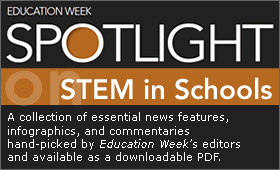Includes updates and/or revisions
A discussion draft of the framework for the national assessment of technological literacy, the first to gauge students’ understanding of and skill in using a range of tools, has been presented to the board that oversees the testing program.
The computer-based National Assessment of Educational Progress in technological literacy, scheduled to be administered to a representative sample of the nation’s 4th, 8th, and 12th graders for the first time in 2012, will evaluate students’ understanding of technology tools and their design, the ways they can be used to gather information and communicate ideas, and their impact on society.
The goal of the technological-literacy assessment should be to help students “understand all of the implications of living in a highly technological society,” said
Alan Friedman, a physicist who is a member of the National Assessment Governing Board, which sets policy for NAEP. Mr. Friedman is the vice chairman of the board’s assessment-development committee.
Those implications, he said, include not only the advances to society that have been created by technology, but also the drawbacks, such as concerns about privacy, as well as the challenges society will face in the future in energy usage and other areas.
When it is made final, the framework will guide the design of the assessment. The draft defines technological literacy as the “general understanding of technology coupled with a capability to use, manage, and assess the technologies that are most relevant in one’s life, such as the information and communication technologies that are particularly salient in the world today.”
The committee embraced a broad definition of technology that ranges from automobiles to computers, including many of the tools that are used in daily life.
Limits to Measurement
Students may be tested on their knowledge of the kinds of tools that are available and how they are used, along with their abilityto apply technological concepts to solve problems. They may be given tasks that demonstrate their ability to use various technology platforms to communicate information or collect and analyze data, evaluate information, and suggest a technology solution to a given problem.

While the assessment is meant to gauge a broad range of skills that are considered essential to technological literacy, the test design may be limited in its ability to measure some areas, the draft states, such as the habits of mind and critical-thinking skills that are considered essential to a deeper understanding and use of technology.
“This is an important development, I can say that without reservations because technological literacy is such a critical element of being a successful 21st - century citizen,” said Valerie Greenhill, the director of strategic initiatives for the Partnership for 21st Century Skills, a Tucson, Ariz.-based advocacy group. “The progression being made in the technology community away from the notion of just technology competence, such as how to use a computer, to … developing that literacy with the use of technology in daily life and in core academic subjects as well is incredibly important. To the extent that the NAEP is developing a framework that guides the development of these competencies is a welcome move.”
A number of states have implemented tests of technology or information literacy, and most have adopted the national K-12 standards in the field produced by the International Society for Technology in Education.
The NAGB committee that has been devising the framework has reviewed state technology standards, studies on assessing technology skills, and the guidelines and recommendations of ISTE and other organizations.
“We want students to undestand that technology is not just computers,” said Senta Raizen, the director of the National Center for Improving Science Education, who co-chaired the framework committee. The center is based at WestEd, a research organization in San Francisco.
The goal, Ms. Raizen said at a meeting earlier this month where the draft was unveiled, is to understand “the human design world, where do things come from, where does our technology come from.”
She and others involved in the project say the material represented in the framework could becovered in science class, but also in subjects across the curriculum, such as mathematics, history, social studies, and language arts.
“We’ve seen movement for reading across the curriculum, writing across the curriculum,” Mr. Friedman said. “Well, technology across the curriculum makes as much sense as those do.”







